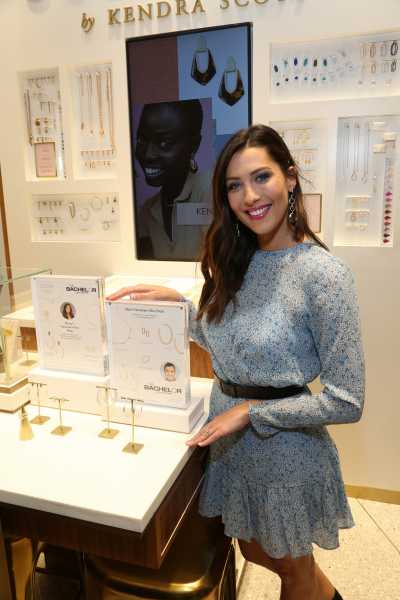
If you’re one of the millions of Americans who watch ABC’s The Bachelor, then you know the peculiar obsession that the show has with “being there for the right reasons.”
It’s been a clear mandate for the 18 years of the show’s existence: Contestants must be willing to enter into a polygamous relationship where they share one man (or woman) with 20-30 other women (or men). They must be willing to wrestle in mud, bungee jump naked, and reveal their tragic pasts. And as they do these things, they must be clear that they are doing them purely for the love of a person they have just met (who, in all likelihood, will dump them on national television).
For almost two decades, contestants have been accusing each other of having ulterior motives for appearing on the show. In the past, the accusation was usually something like, “(S)he just wants to be on TV.”
But now, there’s a new “wrong reason” for appearing on the show: becoming an online influencer.
“She’s trying to create hashtags for her brand,” one woman said of her fellow contestant on a recent episode.
And she may be right. Former Bachelor and Bachelorette contestants have successfully spun their time on the show into various flavors of internet fame — lucrative podcasts, large Instagram followings, a show on CNBC.
In recent seasons of The Bachelor, however, the show has started to let contestants discuss that reality on screen. Which got the team of Reset, Vox’s tech podcast, thinking: How has the online Bachelor ecosystem reshaped the show itself?
Host Arielle Duhaime-Ross brought on Emma Gray, the host of the popular Here to Make Friends Bachelor analysis podcast, to break down the history of The Bachelor’s relationship with social media, and all the ways that the show has been changed by technology.
Below, we’ve shared a lightly edited transcript of Gray’s conversation with Duhaime-Ross.
Listen and subscribe to Reset on Apple Podcasts, Stitcher, or Spotify.
Arielle Duhaime-Ross
I’ve been interested in the crossover between what happens on social media and what happens on the show.
You’ve been watching the show for longer than I have. Was it always like this? Take me back to the beginning of The Bachelor.
Emma Gray
The first season is like going into an alien planet if you’re someone who has watched a lot of the current ones. They spend a lot of the first season kind of trying to convince the audience that the guy who has agreed to be the Bachelor is not completely desperate and crazy, that these women aren’t complete and utter nut jobs. And you can sense that they are assuming that most viewers will mostly just spend the entire time wondering why anyone would do this to themselves.
Arielle Duhaime-Ross
And what about in between seasons?
Emma Gray
In the early years the media and information around the show was really heavily controlled by the tabloids. When the first couple broke up, I believe that they did some sort of live television special follow up that, of course, ABC was able to produce and control.
Arielle Duhaime-Ross
When do things start to change? When does The Bachelor go super online?
Emma Gray
So the show started to dip in ratings, and then, once Twitter came on the scene, the ratings started to increase again, because this whole community of people who were watching the show live and making fun of it and chatting with each other about it started to crop up.
Sean Lowe’s season was the first season I really remember seeing the lead of the show live tweeting the show and making fun of himself. I remember him being very self-deprecating in a way that was incredibly charming and made me like his onscreen persona more.
As Twitter gained in popularity, the show began to realize that if they loosened the reins on the contestants, it could be a mutually beneficial relationship.
Arielle Duhaime-Ross
My question, though, is … at this point, Sean Lowe is not making any money from his tweets.
Emma Gray
No one was making money from this. It was just a way for them to kind of be in conversation with the highly edited version of themselves that you see on the show. I think that was really appealing to a lot of people who were going on reality TV and then seeing a version of themselves reflected back that didn’t feel complete.
Arielle Duhaime-Ross
Okay, so when do people start making money?
Emma Gray
Once Instagram becomes a platform for brands to be selling things. It’s like the funny Twitter bachelor personalities walked so that the Instagram influencers could run.
These reality TV stars now are able to gain very large followings, especially if they make it to a certain point in the show, and especially if they are white and if they are women and brands will then approach them and say, I would like to pay you to post a sponsored ad.
And I think some people are discerning about what they shill for, but others honestly just shill for lots of products that they would never use themselves.
Arielle Duhaime-Ross
Do we know if they’re making a lot of money from this?
Emma Gray
They are making a lot of money for this. And I know that, for example, there is a couple, their names are Tanner and Jade.
They got married. They have two children together now. And this has just opened up this massive world of marketing. The first year that the two of them were really going all in on Instagram marketing, they made more than a million dollars.
Arielle Duhaime-Ross
There are also whole narrative worlds that former contestants create.
Emma Gray
Ashley Laconetti is one of the women that kind of rose to prominence before this Instagram marketing phenomenon had completely taken off. She appeared on two seasons of Bachelor in Paradise, and had a crush bordering on obsession with one of The Bachelorette rejects whose name is Jared.
They had this kind of tumultuous friendship relationship, unrequited love story that happened onscreen, was picked up onscreen and then was on social media and in the press in between this time.
And then off screen Jared, in this very sort of cinematic way said, I’ve realized that I love you, basically. They got together and released this lengthy video …
Arielle Duhaime-Ross
It is 44 minutes long.
Emma Gray
It’s very long.
Arielle Duhaime-Ross
It’s on YouTube and it has 2.5 million views.
Emma Gray
But this again, made them incredibly marketable outside of the world of the show. She and Jared got married and it was not televised, but it was sponsored the hell out of, let’s put it that way. You know, every vendor is listed. It was heavily covered and I have to assume heavily, heavily discounted because they were promoting various brands.
Arielle Duhaime-Ross
These storylines also feed back into the show.
Emma Gray
A bunch of the former Bachelor and Bachelorette contestants ended up at Stagecoach last last year and there were a series of hookups that occurred. Now, almost all of those people ended up then being cast on the next season of Bachelor in Paradise … and instead of papering over [the fact that] these things that happened, the show really leaned into it and actually used the fact that this one guy, Blake, had hooked up with several women in very quick succession, against Blake on the show. It brought those women back in a very calculated way, encouraged them to have conversations about what had happened between them.
It really just merged the world of Instagram or the way that they are documenting their lives on Instagram with the actual plot of the show. And suddenly you realize that this monstrous cycle has been created where The Bachelor actually never ends.
Arielle Duhaime-Ross
So really, like all of a sudden with that season, with this whole Stagecoach drama, like the jig is up … we are faced with the fact that there is a world beyond the show where these contestants are meeting, interacting with each other. And the show is faced with a decision where they have to showcase that or you’re missing a major plot point.
Emma Gray
Right. Exactly. And I think that ABC and Warner Brothers … who produces the show, tend to be traditionally averse to this because they are still operating kind of in the mold of these old school networks and old school production companies. And I think that they struggle to figure out how to engage with the fact that the people they are casting on these shows are all involved with each other and their audience is engaging with all of this content that they’re not controlling.
Arielle Duhaime-Ross
So on the one hand, you have this … And then on the other hand, you have a contestant talking about the idea of using the show to build a brand as something that’s akin to a sin. That feels weird, right?
Emma Gray
Yes. And that you’re really getting at the fundamental tension that exists between the way that this show was initially structured and the way that it existed for many years and the reality of the ecosystem now. And I think what I find so silly is these arguments that the contestants end up having over who’s there for the right reasons, who’s only there for hashtags.
None of these women are stupid. They know also that only one in 30 of them is going to end up being in a relationship with the lead. You know, you’re probably going to go on a TV show and get dumped on national television.
Arielle Duhaime-Ross
You’ve got to get something out of that.
Emma Gray
It is not that crazy to me to be like, well, there’s this other thing that I would still get even if I don’t find love.
I think that the show is struggling with this because they have thrived off of this kind of illusion, that the only reason you would ever go on The Bachelor is because you just want to find love and you believe in the process. And you know what? That hasn’t existed ever. There’s always been an incentive to for a fun adventure to go on reality television to see what comes from it.
And so I think trying to pretend that there isn’t a general awareness of both the viewers and the people participating in the show, that these opportunities exists just feels very silly. It feels like they are fighting a battle that they will lose.
To listen to the full conversation, subscribe to Reset on Apple Podcasts, Stitcher, Spotify, or wherever you like to listen to podcasts.
Sourse: vox.com






